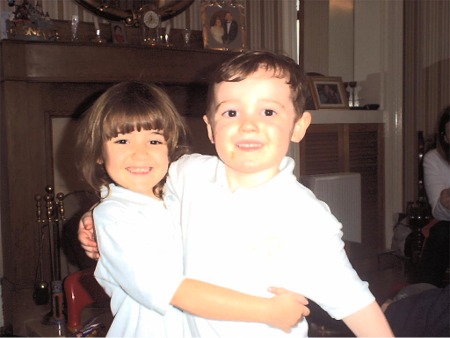Dancing with Disability
"Adjustments" we all have to make them in our lives, sometimes the adjustments are for the greater good such as the wonderful new look for "Dancer", but it means what would normally be covered in one column may now take two. The publisher of Dancer, Owen Goldman has for many years given the Highland Dance world and its dancers a place amongst the elite of the dance world. The staff and Mr. Goldman deserve many kudos for their belief in the dancers of Highland.
It is easy enough to make an adjustment writing a column, counting the words, editing the superfluous, but imagine the child making the adjustment in the rigorous and restrictive world of competitive Highland to accommodate their disability.

Jamie and his friend Kirsty
One such child Jamie has speech and language disorder coupled with sequencing and motor skills problems. There are also pupils in his studio with dyspraxia, dyslexia and diabetic and one who is deaf. So how does the teacher deal with the special needs child?
Gillian Whitelaw, Jamie's teacher writes,
"Within the class it is important that the child does not feel isolated or different from other pupils. Children with disabilities should enjoy the social aspects of attending class with others of the same age. In my class all children develop at their own pace, disabled or not. Each child has individual goals set and these are praised when reached. All goals are set at a realistic achievable level. Not all dancers in a class will reach champion status but the objective is to teach the pupil to as high a standard as they have the potential to attain. Although competitions are important one of the main reasons I teach is to maintain the traditions and cultures of our heritage. In my opinion these are equally, if not more important.
In modern society I feel we should all adopt the attitude of "enablement" not "disablement" in all forms of sport and the arts. For a deaf pupil perhaps finding a way to encourage timing with the vibrations felt on the dance floor or through timing lights. Sometimes using stories (simple humorous stories a child will understand) to achieve a particular activity helps others.
As a teacher it is very gratifying and worthwhile working with disabled children. When they reach set goals I often feel a great sense of achievement just like a pupil winning a championship. I once asked a friend, who works with severely mentally and physically handicapped children, after watching her with a child did she ever get any enjoyment or feel frustration in her work? I asked, why throw the ball 20-30 times to the same child who does not respond? She replied, " one of these times he'll pick up the ball and throw it back, my last few weeks will not have been in vain" I feel this philosophy should be used with all children whether disabled or not and try to do this in my teaching"
Jamie's mum also takes an active role and is pleased with her little dancers development.
" My child has now become part of a group rather than a frustrated outsider. It has helped greatly with his co-ordination, sequencing and motor skill difficulties. Jamie has become a much more self-confident child in all aspects of his life. He has surpassed many goals set by professionals and specialists in relation to his disability. Highland has helped him practice necessary skills without him realizing he has actually been participating in a vital exercise program. I get Jamie to speak through the dance before he competes, this helps his sequence flow. He is received well by other dancers. As dancing is now mainly female orientated he has managed to catch the attention of some of the little girls!"
The competitive Highland dance world is an unforgiving place each dancer pitting their abilities against the rigors of the dance. One slip of the foot on the sword and disqualification, one misstep and you are out of the medals. Once a dancer reaches the intermediate category the steps become longer (SOBHD) from a 4-step fling to a 6. One mum writes:
"My daughter has been diagnosed with ADD/ADHD, we've been managing fairly well for five years. But the problem has manifested itself during her Intermediate level in Highland. She is a really good dancer but will forget the sequence of the steps. It reared its ugly head a couple of weeks ago when she DQ'd herself in three of the five dances. For the first time ever in five years, she came off the platform and cried, completely frustrated with herself. I'd love to hear if any teachers have students with this problem and how they help the dancer get through it?"
Well the challenge is there any ideas?
Questions Comments: lritch7@yahoo.com 1127. W. 4th Street. Lorain, Ohio, 44052.Tel 440.246.6046